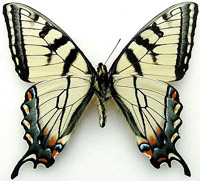Lepidoptera Survey, International

The Taxonomic Report of the International Lepidoptera Survey
Date of this Version
8-12-2001
Document Type
Article
Citation
Taxonomic Report of the International Lepidoptera Survey (August 12, 2001) 3(4): 1-10
Also available at https://lepsurvey.carolinanature.com/ttr/ttr-3-4.pdf
Abstract
Four subspecies of Mitoura grynea occur in the United States east of the Mississippi River. The nominate subspecies occupies this entire area except for Florida and the coastal regions of South Carolina and Georgia. Mitoura g. grynea is usually associated with Juniperus virginiana. A neotype is designated for Lycus gryneus from Aiken County, South Carolina. Mitoura grynea smilacis is endemic to the southeastern coastal islands and coastal mainland from about Brunswick Georgia north to the Santee River delta of South Carolina. Smilacis’ range corresponds to that of Juniperus silicicola in that area. A neotype is designated for M. grynea smilacis from Chatham County, Georgia. Mitoura grynea sweadneri is endemic to eastern Florida (especially along the coast) from about Jacksonville southward. Mitoura g. sweadneri rarely has any fulvous scaling above. Sweadneri’s range corresponds to that of Juniperus silicicola in that area. A fourth subspecies is discussed but not described. This entity inhabits west central Florida. This subspecies tends to have yellowish red fulvous above and yellowish green ground below. Mitoura hesseli is represented in the eastern and southern United States by two subspecies. Mitoura hesseli hesseli ranges from Maine south through Virginia to northern North Carolina. Mitoura hesseli angulata Gatrelle is described from Aiken County, South Carolina. It is larger, ventrally darker, has a more angulate ventral median band and longer tails than nominate hesseli. Mitoura h. angulata ranges from the southern sandhills of South Carolina southward into northern Florida. The populations in southeastern North Carolina are intermediate. The neotypes of grynea and smilacis and the holotype of angulata are currently deposited in the Museum of the Hemispheres, Goose Creek, South Carolina, United States.


Comments
Copyright 2001, International Lepidoptera Survey. Open access material
License: Creative Commons Attribution-ShareAlike-NonCommercial 4.0 International (CC BY-SA-NC 4.0 International)